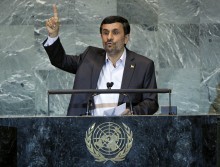The recent the two-year anniversary of the house arrests of opposition leaders in Iran has again raised concerns about human rights abuses in the Islamic Republic—and the US and Israel are promoting awareness. A US State Department press release last week noted that Iran not only stifled political rights in the aftermath of the last election in 2009, but even now have a “campaign of fear and intimidation to extinguish dissent.”
Among the human rights concerns that have left the US “deeply troubled” include imprisonment of political leaders and “ongoing bans on political parties.”
US spokesperson Victoria Nuland said in the press release of Iran’s actions ahead of June’s presidential elections, “Officials have tried to limit open political debate with the detention of more than a dozen journalists and the regime has also tried to silence numerous activists and human rights defenders through arrests and intimidation.
“We repeat our appeal for the immediate release of these individuals and of all prisoners who are being held for their religious or political beliefs.”
The two-year anniversary marks the house arrest of former presidential candidates Mehdi Karroubi and Mir Hossein Mousavi, as well as women’s rights activist Zahra Rahnavard. Nuland noted those were imprisoned “without being formally charged for any crimes.”
The US not only called for their release, but looking ahead to the next vote called on Iranian officials to “conduct fair and transparent presidential elections in June that conform to internationally accepted standards and uphold the rights guaranteed under Iran’s own laws and constitution.”
Israel too has raised concerns about the human rights situation in Iran. President Shimon Peres, speaking with visiting US politicians, noted that human rights “should not be secondary to the other issues we are facing with the Iranians.”
In comments released by his office, Peres listed Iranian abuses in saying that Tehran “exports weapons, terrorists and money to whoever is ready to kill… they hang people without trial, they imprison them and they shoot at demonstrators.”
Said Peres, “We talk so much about the Iranian bomb but we must not forget that Iran is the greatest danger to human rights in Iran and outside of it.”
(By Joshua Spurlock, www.themideastupdate.com, February 17, 2013)

